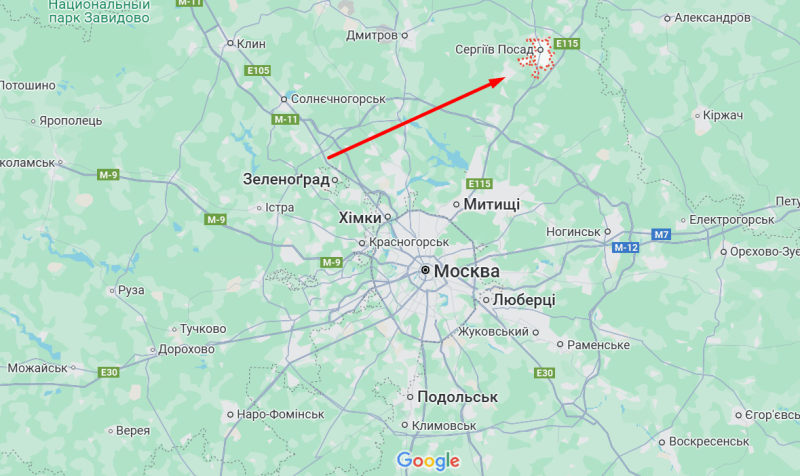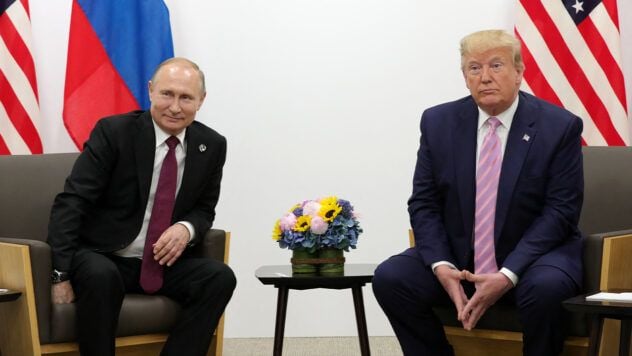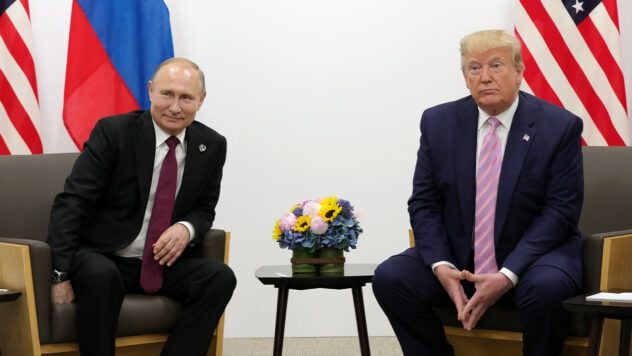news

On Friday, July 4, another exchange of prisoners of war between Ukraine and Russia took place. Military personnel and civilians, most of whom had been in captivity since 2022, returned home.
Now watching
news

Today, July 4, the Ukrainian Armed Forces' Unmanned Systems Forces, in cooperation with other components of the Defense Forces, launched a drone strike on the Federal Scientific and Practical Center Research Institute of Applied Chemistry, located in the city of Sergiev Posad, Moscow Region.
The General Staff of the Armed Forces of Ukraine reported this.
According to the General Staff of the Armed Forces of Ukraine, this enterprise in the city of Sergiev Posad produces thermobaric warheads for kamikaze drones of the Shahed type. The institute is an important link in the armed aggression of the Russian Federation against Ukraine.
Now watching
— It has been confirmed that our weapons have hit the target directly. A fire and heavy smoke have been recorded in the area of the facility. The results of the damage are being clarified, — the Ukrainian military said.
The Defense Forces emphasized that they continue to work to undermine the Russian enemy's ability to carry out air strikes on Ukraine.
It is known that the city of Sergiev Posad is also home to the Zagorsk Optical and Mechanical Plant, a military enterprise that is part of Rostec. The Zagorsk Optical and Mechanical Plant produces pyrotechnics and high-precision optical equipment for the military: infrared night vision devices and binoculars.

Google Maps
Also that night, attack drones attacked the Optical-Mechanical Plant in Azov, Rostov Oblast, Russia, which is part of the Tactical Missiles Corporation and has been under US sanctions since 2022. The Russians have not yet reported any consequences.

Power outages have been reported in Kryvyi Rih, Dnipropetrovsk region. The power went out after Russia launched a drone strike on the city on the morning of July 4.
Local Telegram channels report that problems with electricity in Krivoy Rog are observed from the 95th quarter to Volodymyr Velykyi Street.
The sounds of generators can be heard in the city, as enterprises have launched alternative power supplies. It is not yet known when the power supply will be restored in Kryvyi Rih.
Now watching
It should be noted that the explosions in Krivoy Rog occurred today at about 10:45. Russian troops attacked the city with drones.
The head of the Krivoy Rog city military administration, Oleksandr Vilkul, reported that a civilian infrastructure facility had been hit. A fire broke out at the site. Three people were injured as a result of the attack.
Vilkul also warned residents that the high-speed tram in Krivoy Rog will not operate for several hours, and restoration work is currently ongoing.
The full-scale war in Ukraine has been going on for 1,227 days.
The interactive map of military operations in Ukraine and the map of air raids in Ukraine allow you to monitor the situation in cities.

The Polish consulate was damaged during a massive night attack on Kyiv on July 4.
Polish Foreign Minister Radoslaw Sikorski announced this in a post on the social network X.
“A massive Russian attack last night caused fires and significant damage, including to the Polish consulate in Kyiv. President Trump, Putin is mocking your peace efforts. Please resume the supply of anti-aircraft munitions to Ukraine and impose tough new sanctions on the aggressor,” he wrote.
According to the Polish minister, fortunately there were no casualties among the consulate staff.
Now watching
The Air Force of the Armed Forces of Ukraine previously reported that on the night of July 4, the capital was the main target of the large-scale strike.
Russia launched 11 missiles and more than 500 drones, including Shahed-type kamikaze drones.
As a result of the shelling, hits were recorded in eight locations (9 missiles and 63 UAVs), as well as debris falling in 33 places.

Three Democratic senators have announced the launch of a formal investigation into Washington's failure to increase pressure on Moscow.
The Hill reports this.
Senators Jeanne Shaheen, Elizabeth Warren and Chris Coons released a joint statement criticizing the current administration's policies.
Now watching
According to them, since the beginning of Trump's second term in January, the American authorities have not introduced any new sanctions against Russia due to aggression in Ukraine.
However, in some cases, the existing restrictions were even relaxed. In particular, the lifting of sanctions against Syria led to the exclusion of individual Russian banks and institutions from the so-called blacklists.
A New York Times analysis shows a stark contrast with previous policy. Under President Joe Biden, Washington imposed more than 6,200 sanctions on Moscow-linked entities, amounting to more than 170 new restrictions per month.
“Instead of taking entirely accessible measures to put pressure on the aggressor, President Trump is doing nothing, and we will investigate this lost opportunity to end the war,” the parliamentarians noted.
Lawmakers say the lack of new sanctions allows Vladimir Putin to continue his attacks on Ukraine despite Trump's promises to quickly end the conflict.
They called on the administration to enforce existing sanctions and join European partners in increasing pressure on the Kremlin.
The senators stressed that failure to use existing tools emboldens Putin to continue the war and allows violators in China and elsewhere to fuel Russia's war machine.
“The only path to a just and lasting peace is to demonstrate resolve, side by side with our G7 partners, and show Putin that the costs will only rise,” the Democrats said in a statement.
Let us recall that on June 2, the Pentagon temporarily suspended the provision of anti-aircraft weapons to Ukraine.
In particular, Patriot interceptors, GMLRS missiles and other critical systems.

US President Donald Trump said he sees no progress in talks with Vladimir Putin on a ceasefire in Ukraine.
CNN reports this.
On Thursday, July 3, Donald Trump spoke on the phone with the Russian dictator for almost an hour.
Now watching
“We had a conversation. It was a pretty long conversation. We talked about a lot of things, particularly Iran, and also, as you know, the war with Ukraine. I'm not happy about that,” Trump said.
Answering a question from journalists about possible achievements in the issue of ending the war, he noted that “today I have not made any progress at all with it.”
During a conversation with Trump, Vladimir Putin voiced more accusations and once again refused to actually end the war.
He stated that Russia “will not give up on eliminating all the root causes of the confrontation that have arisen.”
Let us recall that on the night of July 4, Russia carried out one of the largest combined attacks on Ukraine during the entire full-scale war.
The enemy launched at least 550 air targets at Ukraine.
Of these, more than 330 are Shahed-type kamikaze drones, manufactured using Iranian technology.
Missiles, including ballistic ones, were also used.

US President Donald Trump said he sees no progress in talks with Vladimir Putin on a ceasefire in Ukraine.
CNN reports this.
On Thursday, July 3, Donald Trump spoke on the phone with the Russian dictator for almost an hour.
Now watching
“We had a conversation. It was a pretty long conversation. We talked about a lot of things, particularly Iran, and also, as you know, the war with Ukraine. I'm not happy about that,” Trump said.
Answering a question from journalists about possible achievements in the issue of ending the war, he noted that “today I have not made any progress at all with it.”
During his conversation with Trump, Vladimir Putin voiced more accusations and once again refused to actually end the war.
He stated that Russia “will not give up on eliminating all the root causes of the confrontation that have arisen.”
Let us recall that on the night of July 4, Russia carried out one of the largest combined attacks on Ukraine during the entire full-scale war.
The enemy launched at least 550 air targets at Ukraine.
Of these, more than 330 are Shahed-type kamikaze drones, manufactured using Iranian technology.
Missiles, including ballistic ones, were also used.

As a result of enemy shelling of Kyiv and the region, three branches of the New Post Office and a sorting depot were damaged.
This was reported by the press service of Nova Poshta.
Branch No. 114 was damaged, but continues to operate as usual without restrictions for customers.
Now watching
Branch No. 226 was damaged and is now operating in a limited mode – only delivering parcels.
Due to damage to the territory, it is not possible for vehicles to enter the department's territory.
All cargo en route to this branch will be moved to branch #359.
Department No. 223 suffered the most damage.
No employees or customers were injured as the branch was closed at the time of the impact.
The police and the State Emergency Service are currently working on the scene. All parcels have survived and will be redirected to Department No. 122 along with all the items that were sent to the damaged department.
The marshalling depot was also hit in the surrounding area. As a result of the attack, two vehicles burned, but the workers and cargo were not harmed. The depot's operations have already been restored.
Company representatives noted that they actively contact customers and provide all necessary information about changes in service and redirection of parcels.
Let us recall that on the night of July 4, the enemy carried out a massive combined attack on Kyiv and the region. As a result of the shelling, more than 20 people were injured.

At least two explosions thundered in Dnieper.
Local residents report this on social networks.
Before the explosions in Dnieper, the Air Force command warned of the threat of enemy attack drones in the region.
Now watching
Local residents say that air defense is operating over the city.
We are now waiting for official information from the regional military administration.
The full-scale war in Ukraine has been going on for 1,227 days.
The interactive map of military operations in Ukraine and the map of air raids in Ukraine allow you to monitor the situation in cities.

Today's air attack on Ukraine was a record-breaking one – the Russians launched 550 targets, of which more than 330 were Shahed-type attack UAVs. All components of the air defense actively worked to shoot down enemy targets.
The spokesman for the Ukrainian Air Force, Yuriy Ignat, told journalist Yana Brenzei about this on the air of Unified News.
Yuriy Ignat noted that 550 air targets were flying towards Ukraine tonight, of which more than 330 were attack Shaheds.
Now watching
“A huge number, this is an anti-record for us. Unfortunately, the enemy is attacking with a large number of UAVs. 550 air targets in total and more than 330 strike Shahids. This is the largest number that the enemy has used in one attack,” the Air Force spokesman said.
The defense forces intercepted many enemy targets with firepower, and there are also some that have been lost in location – these are drone imitators that the Russians use simultaneously with the Shaheds, emphasized Yuri Ignat.
According to him, unfortunately, out of 11 missiles (Kinzhal, Iskander-M/KN-23 and Iskander-K), only two were destroyed, namely the Iskander-K missiles.
The Air Force representative cited statistics on the number of Russian missiles shot down in June. Thus, last month the air defense managed to intercept only 8 missiles out of 17 Kinzhals, more than 150 cruise missiles and dozens of Iskander-M ballistic missiles.
According to him, sometimes it is possible to intercept more than 50% of enemy missiles, sometimes it is not possible – for which there are understandable reasons.
— In order to protect a city like Kyiv, one Patriot battery is not enough… Patriot radars have a certain range, that is, they “see in one direction”. And in order to cover a large city like Kyiv, several such air defense systems are needed, — emphasized Yuriy Ignat.
The Air Force representative noted that during massive enemy attacks on Ukraine, our Defense Forces use all available means, including: aviation, anti-aircraft missile forces of the Air Force, and air defense of the Ground Forces.
— The air defense of the ground forces is an extremely important component, because they work specifically on attack drones. Electronic warfare systems also work. Mobile fire teams provide a significant percentage of drone downing, — emphasized Yuri Ignat.
According to him, the enemy attacks at different heights, so mobile fire groups are very necessary for our defense, because they give serious results.
In addition, drone interceptor operators are also very effective. To date, dozens and dozens of drones have been destroyed using this method.
